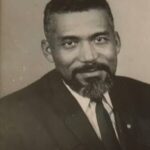PLAATJE, SOLOMON
- 8 Min Read
Solomon Tshekisho Plaatje (circa 1876-June 19, 1932) was a distinguished South African writer and nationalist. He served as the first secretary general of the African National Congress and later was elected its senior vice president.

PHOTO CAPTION: Plaatje Solomon. SOURCE: EA Library.
Early in this century, he was instrumental in bringing international attention to the plight of black South Africans. In later years, Plaatje worked on a variety of social causes and produced several literary works.
Plaatje was educated in Lutheran and Church of England mission schools in the Cape. Although he later took private instruction at the Pniel mission station of the Lutheran Berlin Mission Society, he was to receive no formal education beyond the fourth standard. Despite his limited educational background, he was an accomplished man with a marked facility for languages.
At an early age, he acquired a remarkable proficiency in German, English and Dutch as well as his native language, Tswana. In 1894, after working two years as a pupil teacher at Pneil, he became a mail carrier in Kimberley. The move provided Plaatje with his first urban experience and his first contact with prominent African political leaders such as the Rev. Jonathan Jabavu (the brother of John Tengo Jabavu, editor of Imvo Zabantsundu), Gwayi Tyamzashe, and Isiah Bud M’Belle. While in Kimberley, Plaatje began to develop his journalistic and critical skills by contributing articles to various newspapers, and by becoming an active member of the South African Improvement Society.
In 1898 Plaatje won the highly sought after appointment of interpreter to the magistrate’s court at Mafeking. By the time he assumed his duties, he had gained a mastery of the Sesotho, Xhosa, Zulu and Korana languages, in addition to those he studied at Pneil. In October 1899, the Anglo-Boer War broke out, and Mafeking, an important town not 10 miles from the Transvaal border, was immediately surrounded by Boer forces.
During the siege of the city, the scope of Plaatje’s duties expanded considerably. He remained interpreter to the resident magistrate but also officiated in the Court of Summary Jurisdiction, presided over by Lord Edward Cecil. In his off hours Plaatje sold his secretarial skills to various correspondents in Mafeking. As the resident magistrate, C.G. Bell, was also the civil commissioner responsible for administering the Africans in the area, eventually Plaatje was made his liaison officer.
In this capacity, he was brought into close contact with the African rural population at Mafeking and witnessed first hand their poverty and suffering from the rinderpest epidemic (1896) and the siege. This experience profoundly influenced Plaatje and, throughout his career, he retained an interest in rural affairs. While in Mafeking, Plaatje lived in the Tshidi-Barolong capital village with the chiefly Molema family. The Molemas were educated and wealthy land owners, with extensive business interests in Pitsani and Bechuana. Plaatje formed a close friendship with one of the younger sons, the politically astute Silas Telesho Molema.
It was Molema who, at the close of the war, urged Paatje to leave the civil service and take up journalism as a profession. Soon after, Plaatje, with the financial backing of Molema, launched the Setswana-English weekly Koranta ea Becoana (Newspaper of the Tswana) which he used as a platform to oppose encroachments on African rights.
After seven years of publication, Plaatje left Mafeking and the newspaper closed down. He moved to Kimberly where, in 1910, he edited the Tsala ea Batho, a trilingual weekly, owned by a syndicate of wealthy land owners in Thaba ‘Nchu.
The paper was widely read in the Tswana area in the western Transvaal, the northwest Cape and the Orange Free State; it also appears to have had a substantial following among the diamond mine workers in Kimberley. For some time before the founding of the newspaper, Plaatje had been involved in the movement against the impending Union.
Like many of the educated Africans of his day, Plaatje had a profound distrust of Boer intentions toward black South Africans. In 1909 he became a founding member of the South African Native Convention, (S.A.N.C.) which had been called to discuss the pending union. In 1910 Plaatje led a deputation appointed by the S.A.N.C. to General Botha, then the prime minister of the Transvaal. At a caucus meeting of the S.A.N.C. in August 1911, several members, including Pixley ka Seme and Plaatje, issued a call for the creation of a new, more representative and united organisation.
In January 1912, the South African Native National Congress (later the ANC) was established. John Langalibalele Dube was made its president general and Sol Plaatje became its first general secretary. Plaatje was to play a prominent role in mobilising the young organisation to meet its first serious test, the Natives’ Land Act of 1913. This legislation designated certain sections of the country “native areas” in which Africans could own land, while elsewhere they were prohibited from purchasing land.
Following enactment, Plaatje took it upon himself to tour South Africa to investigate the effects of implementation. These findings were reported to the ANC in several sessions, and later would form the basis of his work Native Life in South Africa Before and Since the European War and the Boer Rebellion (1916). Soon after, Plaatje was made part of the ANC delegation sent to Cape Town to protest the legislation. When the protest proved unsuccessful in getting the Act repealed, Plaatje urged the ANC to send representatives to the Imperial Government to make known their position. In 1916 a deputation that included Plaatje was sent to England to lobby the government.
This delegation, too, proved unsuccessful, but Plaatje elected to stay in England to carry on the campaign. While there, he wrote for various newspapers, toured both England and Scotland, made more than 300 speeches, and published his Native Life in South Africa. He also found time to collaborate with noted linguist, Prof. David Jones of London University, on a Sechuana Phonetic Reader, and also wrote his own Sechuana Proverbs and Their English Equivalents.
Plaatje returned to South Africa early in 1917 and was immediately caught up in the protest against the Native Affairs Administration Bill. His attacks on the government became more bitter and found their way into the daily press. At the annual convention of the ANC, in June, Plaatje was offered the presidency. This he refused, but agreed to serve as a senior vice president.
In response to Wilson’s call for “self determination for small nations,” the ANC sent a deputation, with Plaatje as head, to the Peace Conference in Paris. Ironically the Afrikaners also sent a delegation under General Hertzog. Plaatje used the occasion to issue his pamphlet, “Some of the Legal Disabilities Suffered by the Native Population of the Union of South Africa and Imperial Responsibility.”
While in Europe, he attended the Pan African Congress, organised in Paris by W.E.B. Du Bois, where he made contact with other African leaders. Before returning to South Africa, Plaatje made a tour of the U.S. and Canada, where he lectured to audiences about affairs in South Africa. He made substantial contacts within the Afro-American community, appearing on the same platform as Marcus Garvey and J.E. Bruce, He also maintained ties with Du Bois and the leadership of the N.A.A.C.P. During his time in the U.S., Plaatje also published The Mote and the Beam: an epic on the sex relationship twixt white and black in British South Africa (1921).
Discouraged by the failure to arouse sufficient international concern for the South African situation, Plaatje returned home in 1923. Back in South Africa, he generally withdrew from active politics, devoting himself to literary and social matters. He became active in the temperance movement, editing the Independent Order of True Templar’s journal, Our Heritage. Always interested in history, he wrote the biographies of two 19th century Rolong chiefs. His novel, Mhudi, a historical romance, published in 1930 (but written much earlier), was a blend of politics and oral traditions. Mhudi was one of the first English novels written by a black South African.
In 1916 Plaatje had contributed an essay to Sir Israel Gollancz’s Book of Homage to Shakespeare. Later, he translated two of Shakespeare’s plays into Tswana: “Julius Caesar” and “Comedy of Errors.” Manuscripts of his translations of “Romeo and Juliet,” “Much Ado About Nothing,” “The Merchant of Venice” and “Othello” were lost. Recently a journal Plaatje kept during the Siege of Mafeking, The Boer War Diary of Sol T. Plaatje, was discovered and edited by John Comaroff.
Plaatje died of pneumonia in Johannesburg in 1932. He was survived by a wife (the sister of Isiah Bud M’belle), three sons and two daughters. Although he spent the latter part of his life concerned with social issues, Plaatje made his most significant contributions as journalist and publicist for the cause of African nationalism. He was a pioneer in the history of the African press. His career coincided with the heyday of independent African newspapers. Plaatje took full advantage of his position and skills to bring the South African situation to worldwide attention.
PHYLLIS BOANES




